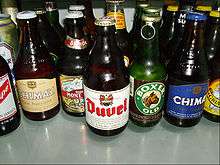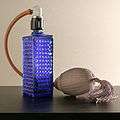Glass bottle


A glass bottle is a bottle created from glass. Glass bottles can vary in size considerably, but are most commonly found in sizes ranging between about 10ml and 5 litres.
History
The history of man-made glass can be traced back to 5000-3500 BC, from which glass coated objects have been found.[1] The first hollow glass container was made around 1500 BC, when it was produced by coating sand with molten glass. This method was later replaced by the increasingly popular process of glass blowing.[2]
Manufacture and reuse
A glass bottle is 100% recyclable with many new bottles containing glass which was created over 20 years ago. Less energy is used in recycling a glass bottle than creating the glass from raw materials, helping the environment.[3] In 2012, 96% of the glass bottles sold in Switzerland were recycled.[4]
Glass bottle manufacturing takes place over several stages. To briefly outline the processes from beginning to end: raw material, melting, forming, annealing, physical inspection, machine & laser inspection, secondary physical inspection, quality control, and finally packing.[5]
Glass bottles are sometimes reinforced through lamination. Laminated safety glass is made by coating a glass surface with a layer of plastic. When a standard glass bottle is dropped, the glass breaks and scatters. When a laminated bottle is dropped, the glass still breaks but the layer of plastic remains intact, keeping the glass pieces together.[1]
Once made, bottles may suffer from internal stresses as a result of unequal, or too rapid cooling. An annealing oven, or 'lehr' is used to cool glass containers slowly to prevent stress and make the bottle stronger.[6] When a glass bottle filled with liquid is dropped or subjected to shock, the water hammer effect may cause hydrodynamic stress, breaking the bottle.[7][8]
Markings
Modern bottles, when moulded, will be given marks on the heel (bottom) of the bottle. These marks serve a variety of purposes, such as identifying the machine used in the production of the bottle (for quality control purposes), showing the manufacturer of the bottle, how much to fill the bottle to, the date the bottle was manufactured, as well as other information. These marks can be given as numbers, letters, symbols and for machine quality control identification, as a series of dots.[9][10][11]
See also
- Boston round (bottle)
- Glass container industry
- Growler (jug)
- Mason jar
- List of bottle types, brands and companies
- Closure (container)
- Hutchinson Patent Stopper
Notes
- 1 2 "Glass Information". Archived from the original on April 23, 2011. Retrieved 2008-10-02.
- ↑ "History of Glass". British Glass. Retrieved 20 July 2015.
- ↑ "Glass Facts" (PDF).
- ↑ http://www.bafu.admin.ch/dokumentation/medieninformation/00962/index.html?lang=fr&msg-id=50084 (page visited on 4 November 2013).
- ↑ "Glass Manufacturing". Retrieved 2008-11-26.
- ↑ "How Glass Bottles are Made". Retrieved 2010-03-09.
- ↑ Saitoh, S (1999). "Water hammer breakage of a glass container". International glass journal. Faenza Editrice,. ISSN 1123-5063.
- ↑ Brandt RC; Tressler RE (1994). Fractography of Glass. Plenum Press. ISBN 0-306-44880-7.
- ↑ "Behälterkennzeichnung". Retrieved 2016-03-21.
- ↑ "How to Read a Glass Bottle" (PDF). Retrieved 2016-03-21.
- ↑ Dobson, Jim. Glass Container Defect Manual. p. 7-8. ISBN 9780557336067.
Bibliography
- Soroka, W, "Fundamentals of Packaging Technology", IoPP, 2002, ISBN 1-930268-25-4
- Yam, K. L., "Encyclopedia of Packaging Technology", John Wiley & Sons, 2009, ISBN 978-0-470-08704-6
External links
- Antique Bottles collectors/traders
- North American Soda and Beer Bottles
- North American Food and Drug Bottles
- Glass Manufacturer's marks & logos seen on Antique & Modern Bottles and other Glassware (primarily American)